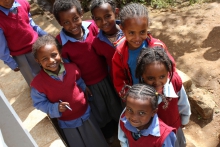World Bank consultations on SDGs and education

“Economic growth is the most powerful tool we have for realizing a world free of poverty. The world economy needs to grow faster and more sustainably,” said President Kim, “It needs inclusive growth that promotes opportunity for all, and that requires the full participation men and women.”
“When women earn more, public finances will improve and commercial profits increase because of increased demand and productivity,” he said. “When we promote true equality—including equal pay for equal work—we all stand to benefit, because better educated mothers produce healthier children, and women who earn more invest more in the next generation.”
Along with other multilateral development banks (MDBs) and the IMF, the World Bank Group announced plans July 10 to extend more than US$400 billion in financing over the next three years and work more closely with private and public sector partners to mobilize the resources needed to achieve the historic new Sustainable Development Goals (SDGs).
The Bank Group is now concluding global consultations on a new gender strategy, to be launched in late 2015. Participants from government, civil society, and the private sector have stressed that along with healthcare and education, women need equal access to good jobs, training, financial resources, safe public transportation and other key infrastructure, and support in caring for others. It is essential that PSI’s ESCW Network play an active role in engaging the World Bank on educational issues and ensuring that its new gender strategy reflect an understanding of the evident relationships between gender and precarious work in education.

